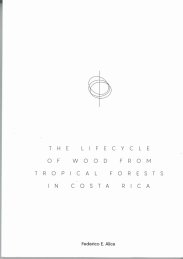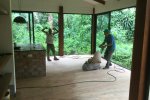
Project
The lifecycle of wood from tropical forests
To better understand the role that tropical forest management might play on climate change mitigation we must consider the complete lifecycle of harvested wood and the benefits from the substitution of non wood products. Current accounts quantifiyng only the carbon losses that result from logging have improved our knowledge but represent just a partial view of the system. Integrating both the complete carbon and greenhouse gas balances through a lifecycle assessment will allow us to determine the impact accurately, and help us answer the question on wether we should continue on the path towards a forest conservation future or a broader approach to climate smart forestry.
Carbon Balance: Through a complete biomass/wood flow analysis and a lifecycle carbon accounting approach, we determine the carbon balance of the management of tropical forests in Costa Rica.
Lifecycle Assessment: We complement the carbon balance of forest management with a lifecycle assessment (including all phases from planning to end of life) based on primary data for the climate impact of forest management in Costa Rica.
Substitution effect of wood products: Based on the climate impact of wood products and that from substitute products (conventional energy sources, plastic, cement, metal, etc.) we determine the displacement factor for the most relevant functional products obtained from tropical forests.
Long term scenarios: We integrate all results and run long term scenarios for the potential mitigation outcomes of different forest management pathways also in Costa Rica. By doing so, we will be better able to determine how can climate mitigation be maximized without compromising the future of forests.
Upscaling: The understanding from this particular system together with a review of literature will enable us to upscale results from a country case study to a regional/global assessment from the impact of tropical forest management on climate change mitigation.
This research is conducted in cooperation with Escuela de Ciencias Ambientales, Universidad Nacional de Costa Rica
Publications






